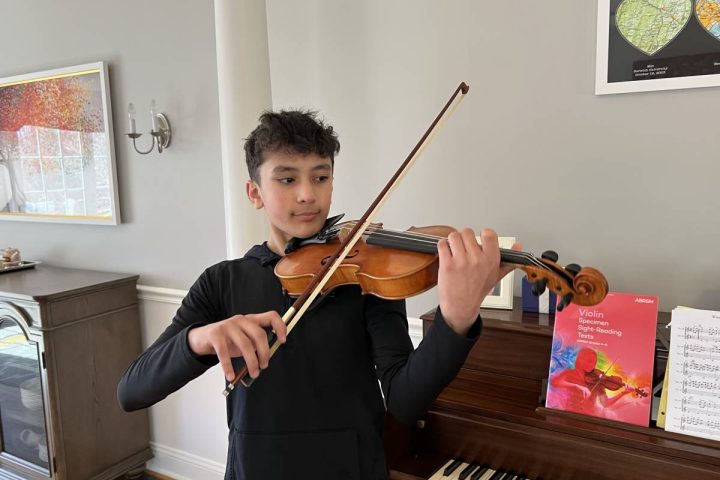Editor’s Note: The following is Board of Education member Nick Kapoor’s comments on his Transgender and Gender Non-Conforming Policy proposal made during Monday night’s board meeting:
Imagine waking up and looking in the mirror. You know that you see you, but the image staring back at you isn’t the true you. Imagine for a moment knowing something about you that other people might think is ugly or wrong or a mental illness and attempting to deal with that in silence…as a child. This is my story and it is the story of hundreds of thousands of children across our country every day. I’d now like you to imagine your child having to look in the mirror and see someone that they don’t identify with and adding all the pressures of what it means to be a child or young adult in 2022 on top of that – it almost seems unbearable.
I’d like to address several of the concerns and points I’ve heard over the last ten months and tell you exactly why we need the Transgender and Gender Non-Conforming Policy.
First, I’ve heard that there have been no formal complaints to the Superintendent’s Office around this issue and so why do we need a policy? Using formal complaints to the Superintendent’s Office isn’t the right measuring stick. But, there is a problem – we have the data to show that. About 20% of our Masuk students identify as LGBTQ+. This can be externally validated by the Gallup poll I spoke about at the last meeting that shows the same proportion of Gen Z identifying as LGBTQ+ in a nationally representative and scientific poll. 41% of LGBTQ+ identifying Masuk students say they have been the target of LGBTQ+ based discrimination. This was internally corroborated by the 2021 Climate Survey where 7.6% of all Masuk students said that they had been the target of LGBTQ+ based discrimination. This calculates almost perfectly to 41% of the 20% who identify as LGBTQ+. 28% of all Masuk students said they had witnessed LGBTQ+ discrimination, yet only 3.6% reported it. In national surveys, the CDC found that 35% of all transgender high school students have attempted suicide. In their 2019 Connecticut snapshot, GLSEN – the Gay, Lesbian, and Straight Education Network found that 91% of Connecticut public school students heard the word “gay” used in a negative way and 68% of students heard negative remarks about transgender students.
Furthermore, the Connecticut State Department of Education encourages local Boards to pass policies like this, “While school boards, as a general rule, have protective anti-discrimination policies to advance the safety and well-being of the student population, school districts are faced with more difficult conversations about how to implement those policies on a day-to-day basis. How do schools allow equal access, but respect privacy for transgender and other students? How does a school district apply its dress code for transgender students? And how to schools regulate student use of single-sex restrooms and locker rooms? School boards and school staff must answer these increasingly common questions through policy and daily on-the-ground decisions.”
Passing this policy should be the first step in several steps to address these issues.
Second, this policy has gone through some procedural hurdles. It was hung up in the Policy Committee for an unnecessarily long 10 months. Meanwhile, Policy No. 9132 – a policy to create a Diversity, Equity, and Inclusion Committee that I submitted jointly with the Transgender Policy has yet to appear on a Policy Committee agenda. Even if it appears on the September Policy Committee Agenda it will have been 14 months since it was first introduced.
Third, I emailed everyone individually twice and also publicly said twice that I am ready, willing, and able to talk to anyone who would like to discuss this policy with me. I pleaded with you to help me get to a place that we could come together and compromise and pass this. I even suggested taking out some of the provisions that seemed to garner more comments and were more of the alleged controversial sections and that those could be voted on separately. No one contacted me. And there was virtually no discussion at the last meeting. Even in our dysfunctional Congress in Washington, people at least talk to each other.
Fourth, I believe in local control of education. Everything in this policy is or is an interpretation of state law – CABE wouldn’t have written it that way if it wasn’t. We do this all the time – we reiterate state law. Rarely is something in a policy brand new and specifically unique to Monroe and to nowhere else. If the argument is that this policy adds nothing new, then why do we have policies at all? Why do we have a policy book? We did an 8-page rewrite of Title IX policy last summer. Why did we do that? Why didn’t we rescind the Title IX policy in its entirety and just point employees to Title IX in federal law? The answer is it’s important for us to have a local policy statement on Title IX. It’s important to have a local document that our specific employees can read and apply to our local situation. Tonight, we are voting to amend our IEP and Special Education policy – why are we doing that if Public Acts 21-46 and 21-144 already address the changes we’re making? Because it’s important to have a local policy on this.
Fifth, I’ve heard that an enumerated list of protected classes in our state law preempts anything that we need to do at the local level. I hope that we will be considering rescinding policies on religious accommodations, Policy No. 4118.114 on racial and ethnic harassment, Policy No. 5118.1 on homeless students, and Policy No. 6141.12 on migrant students. If an enumerated list of protected classes in state law covers all of this then why do we have these policies on the books? It does not make sense to vote down the transgender and gender non-conforming policy but keep these other policies on the books.
Our kids are listening. The transgender and non-binary kids of Masuk are listening and reading how we act. If you’re a student in the Monroe public schools system and you’re out as LGBTQ+ or if you’re questioning if you’re LGBTQ+ and you hear what has been happening over the last ten months do you feel safe in our schools? If you’re an LGBTQ+ teacher looking to get into the teaching profession or change districts and you google Monroe public schools and LGBTQ+ as search terms, articles written about this policy are certainly going to come up. Would you feel comfortable coming to teach here? Would you feel safe as an LGBTQ+ teacher in the Monroe public schools right now?
If you’re not here to pass a policy like this, why are you here? Isn’t it our job as members of the Board of Education to pass policies protecting the rights of our students?
As I’ve said before, ten years from now, but hopefully fewer, this policy will pass and it will be shocking to the Board at that time that in 2022 something like this was defeated. As I said earlier, 1 in 5 members of Generation Z identify as LGBTQ+ and 1 in 10 Millennials identify as LGBTQ+. I am sad for the 20% of Masuk students who identify as members of the LGBTQ+ community who have to live and learn in a district where their Board of Education won’t support them.
Ann O’Doy showed us in her presentation that sexual orientation and gender identity stress and anxiety are a part of the increase that we’ve seen. It seems like we’re poised to add to that tonight. Why do we, the Board of Education, want to add to the trauma? It is conversations like these and the vote that we’re about to take where the trauma can begin for some of our students. I want to really emphasize the potential impact that our vote tonight can and will have on our students.
I hope for the graduating class of 2022 that they will end up in a job, in the military, or in a college that has policies in place to protect them and respect them for who they are, because, unfortunately, we can’t do that here on the Monroe Board of Education.
We’re telling our transgender and gender non-conforming students we don’t care about them; you don’t matter to us.
It is a strange case of irony that we are having this discussion during Pride Month and five days before our third annual town Pride Flag raising. The discussion around this policy and the likely upcoming action of this Board shows us how far we actually have to go in the fight for true equality for all LGBTQ+ people. Same-sex marriage wasn’t the end of the battle as so many had said it would be, but only the beginning. What more could they want some media pundits said after Obergefell legalized same-sex marriage 7 years ago and tonight’s discussion and vote is a perfect example of that.
I understand that society is changing and change can be scary. Things we don’t know about can be scary, unfamiliar, and uncomfortable, but that doesn’t mean we don’t take them head on. It is to better society and make us more inclusive for the betterment of all.
To all of the students of Monroe public schools who are watching or who will read about this – never give up. We keep fighting. There will always, always be people standing in the way of justice and what is right. I encourage you to run for this Board if you stay here or come back to Monroe to raise your family and be the change you want to see. I may be the only one without kids around this table, but I’m also the only Millennial here and I’m so hopeful for more Millennials and Gen Z’ers to join this Board in the coming years.
I want to end where I began. Think about your kids. Think about your grandkids. If you have or had children in our school system and they came out to you, wouldn’t you want them to feel supported? Wouldn’t you want to know that the Board of Education, the highest officers in the educational system of our town supported them? The answer to that question, for me, is unequivocally yes. And to accomplish that goal and begin the process of creating a more inclusive school system for all of our students that we have in Monroe, we should pass this policy tonight.





